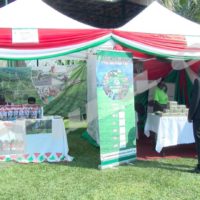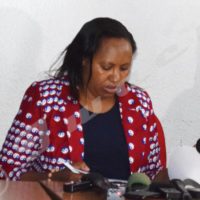
Godefroid Manirankunda, the national coordinator of PACT- project EAC2
In a press conference held yesterday in Bujumbura on the project “Promoting Agriculture, Climate and Trade Linkages in East African Community, Second Phase (PACT- EAC2)”, Severin Sindayikengera, director of the national food technology centre (CNTA) explained that Burundi is facing many challenges in relation to the promotion of the industrial agriculture. He mentioned here the lack of energy, insufficient raw materials and the absence of the private sector’s involvement as well.
This lecturer at the University of Burundi also mentioned the shortcomings in the quality control.
“We observed that many production units are re-using old packaging with very harmful consequences on consumers’ health.” He gives an example of different kinds of juice or drink industrially made in Burundi, that are sold in bottles of “ Heineken” brand.
Another challenge he pointed out is the reluctance of commercial banks to provide credit to farmers so as to increase their agricultural production.
Signs of hope
Severin Sindayikengera believes that Burundi has the main agro-industrial development potential for fruit, vegetables and palm oil compared to other EAC member states.
In the same sense, Jean Bizimana , the deputy director at the rural training centre (CFR) of Giheta in the central province of Gitega says that palm oil generates BIF 8 billion to producers and $ 2.5 million of tax revenue every year.
The director of CNTA also put his hope on hydroelectric dams being built. According to him, this shows that very soon, the energy issue will be solved.
As for the lack of raw materials, he believes that Burundi will import it as it is the case for Minolac company of Muramvya , which imports much of its raw materials.
“To get there, we must start with small agricultural plants. We should also encourage the private sector to participate more actively in agro- industrial development.”
Godefroid Manirankunda, the national coordinator of PACT- Project EAC2, classifies Burundi in the 4th position like Rwanda in comparison with other EAC member states. However, he highlighted that Rwanda was able to fill this gap by developing considerably the sector of goods and services such as tourism, hospitality, Internet, transportation, etc.



















 IWACU Open Data
IWACU Open Data

